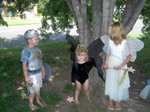
Because this email post can be accessed by the general public at this link....
http://134.129.111.8/cgi-bin/wa.exe?A2=ind0803b&L=gr-heritage&T=0&P=390
...I am reposting it to my blog via copy and paste.
Date: Mon, 10 Mar 2008
12:44:32 -0600
Reply-To: Richard Benert
Sender: GR-HERITAGE Germans from Russia
From: Richard Benert
Subject: Re: Information needed for cutting
manure for heating and cooking
I'm taking the liberty of sending this to the whole list, since I think
that this may be a subject that has engaged the inquiring minds others than just
Joan. It's from P. S. Pallas, "Travels Through the Southern Provinces of
the Russian Empire in the Years 1793 and 1794," 2nd ed, London, 1912 (repr.New
York, 1970), pp. 61-62.
"In these as well as the other colonies on the Karamysh [he refers to
Talovka and Sofnofka], and in some of the lower settlements along the Ilovla,
the want of fuel, previous to the year 1788, had been severely felt. Since that
time the inhabitants have learnt to make an artificial peat, composed of dung
and straw. This invention was suggested to them by Frederic Rish, a native
of the turfy island of Rugen, in the Baltic Sea, and now a colonist of
Ust-Salikha. The colonists can spare their dung for that purpose, as the
loose black soil requires only to be divided into fallows, to restore its
fertility; and they have a superabundance of straw. The dung is gathered
in heaps, and left to putrify during winter. After the first agricultural
labours of the spring are finished, this compost is carried to the water-side,
placed several feet deep, on a dry spot, mixed with a proportionate quantity of
straw, and then trampled upon by horses and oxen, till it form a compact
mass. When it is half dried in the open air, it is cut like turf into
square pieces, which are piled up till they are completely dried, and afterwards
carried home, where they serve as a stock of fuel for the winter. This
artificial turf has long been used by the Crim-Tartars; it burns with a flame
not unlike sea-coal, and imparts excellent heat, particularly to stoves and
ovens for baking. Its smoke, however, is offensive, and is with much
difficulty excluded from the inner apartments. Five or six pieces of it
are sufficient to heat an oven; and a few men, with several pair of horses or
exen, are able to prepare, in the course of a week, sufficient fuel for the
whole winter."
He then says the colonists had "most injudiciously" cut down all the trees
in the area, requiring them now to use manure and straw for heating. They
now would gladly plant slips from the willows and poplars on islands in the
Volga if they could get permission.
Dick Benert
What impressed me about this most was, "a few men, with several pair of horses or oxen, are able to prepare, in the course of a week, sufficient fuel for the whole winter." I do believe it takes more men and/or longer than that to obtain enough wood for a whole winter. Not to speak of the destruction to the forrest. Why wasn't the lesson learned to respect the forrests from this experience.













No comments:
Post a Comment